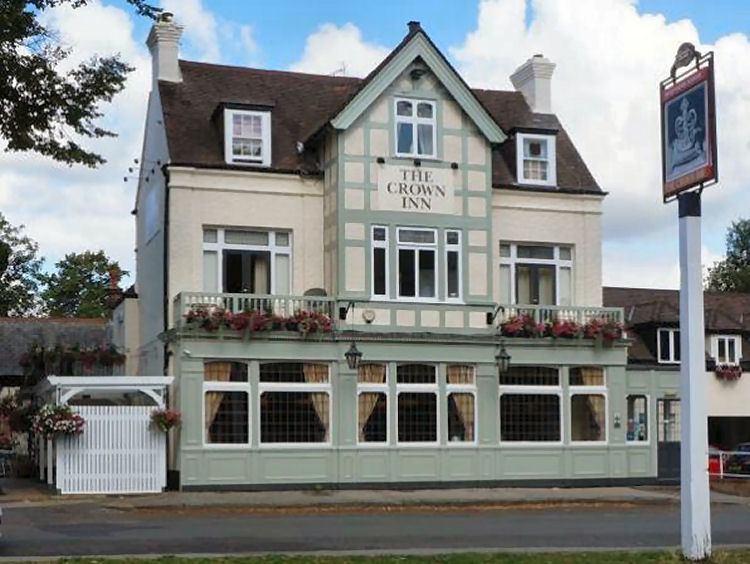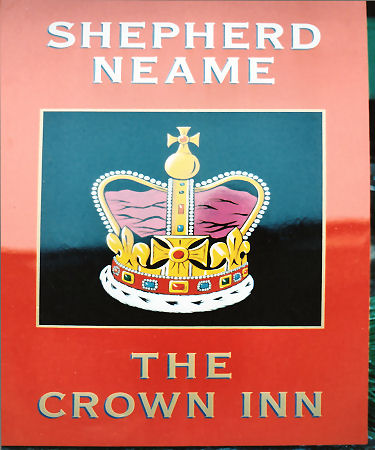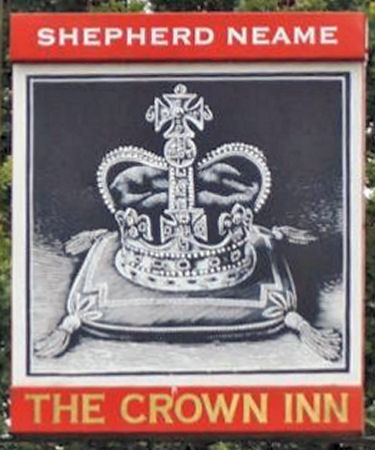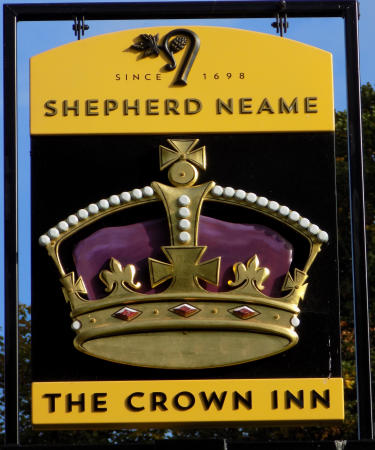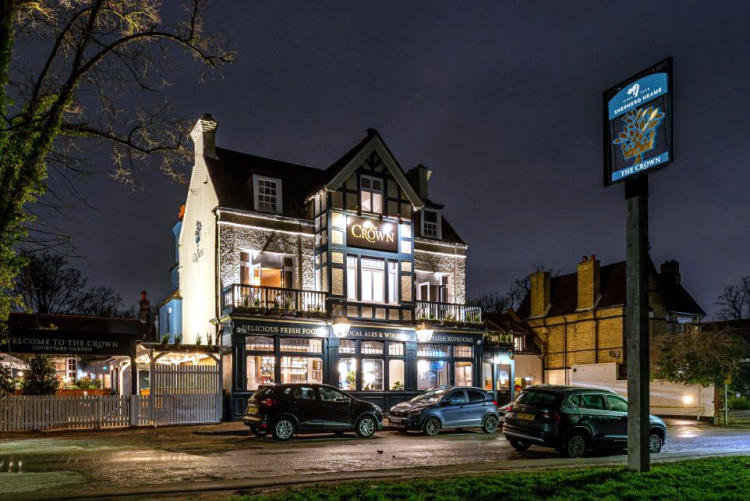|
West Kent Guardian, 2 January 1841.
CORONER S INQUEST.
An inquest was held on Thursday se’enmght, at the "Crown Inn,"
Chislehurst, before Mr. C. J. Carttar and a highly respectable jury,
upon the body of Priscilla Ann Sharp, whose death it was alleged had
ensued from having been prematurely removed from the workhouse of
Newington-butts, Surrey, under the following circumstances. The
investigation created great interest in the neighbourhood, and the
jury-room was crowded to an overflow.
Mary Sharp, sworn, said I am mother to the deceased, and hold the
situation of mistress to the poorhouse of Chislehurst. She was 22
years of age, and had been living with her aunt, who is matron of
Newington workhouse, which is situate at Walworth. My daughter had
been living there about six months as her assistant. I do not know
whether she was appointed by the guardians or not. She had enjoyed
good health. I received the letter I produce on the 16th instant,
which states that my daughter was ill, and requested me to fetch her
home. I immediately went to town, and found my daughter very ill,
and confined to her bed. I saw a medical gentleman and a person who
stated that he had written the letter to me. I was asked by Mrs.
Phillips (my sister) to take her home with me. I replied that she
was too ill to be removed. She then said, “Here is a medical man,
and he knows best." The doctor observed that she ought to be
blooded. I requested that my daughter might remain until the
morning. He said that she would be too ill to go then. I said, “if
that is the case, she is not fit to be removed to night.” He replied
that he would have blooded her, but that he understood she was going
away. I then went up stairs to my daughter. Mrs. Phillips came into
the room and said, "Make haste, the fly is waiting.” My daughter
said, “Is my mother going?” and she said, “Yes, and you are going
too.” Mrs. Phillips said she had better be wrapped in a blanket.
My daughter was not able lo get out of bed, and a man was sent up to
carry her down to the fly. I said to Mrs. Phillips,
“How cruel you are, you would not serve a pauper so:" when she
replied, "Don’t be saucy.” When my child was carried into the fly,
she perspired violently. She did not express any wish to go home.
She said “Oh dear,” when my sister told her she was going.
By the Coroner:- I had but little conversation with the medical man.
He said that she might then be removed, but would be too ill
to-morrow. We came home in a close fly, and reached Chislehurst
about 9 o’clock at night. She did not speak during the journey. The
medical man gave me some medicine before I left. She had cold
shivers with perspiration. After we reached home I sat up with her
all night. She was very ill next day. I went in the morning for Dr.
Williams of Bromley, who pronounced her dangerously ill, and
expressed much surprise at her being removed. She expired on Monday
morning, about 11 o'clock. Every attention was paid her after I got
her home. She sobbed very much, and said that if her aunt came she
would not see her.
Mr. William Lambe, of No. 1, Bolingbroke-row, Walworth, surgeon and
apothecary, sworn, said, I am not surgeon to the union. I know the
deceased. I was called to attend her on the 11th inst. at the
poorhouse, by Mrs. Phillips. The deceased was in her sitting room
labouring under fever. Her pulse at eighty-six. Her breathing bad. I
gave her medicine. On the following day she appeared better. On
Sunday she was not so well, and I gave directions that she should
remain in bed, the fever having increased. On Monday she was rather
better. I continued the medicine. On Tuesday she was decidedly
worse, and I thought, from the deceased’s state, it would be
advisable to write to her friends, Mrs. Phillips having mentioned
the uncertainty of her continuance as matron. She was worse on
Wednesday afternoon, and her pulse varied from 98 to 100, and I
considered her in a more excited state of fever. I saw her mother
there, and she has given a correct statement of what transpired. I
told her mother that the deceased required more attention than Mrs.
Phillips could devote. She spoke of the state of the weather, and
wished her daughter not to be removed until the following morning. I
said that if she was removed, it must be done at once. Mrs. Phillips
had said that it was necessary for her to be removed, as the board
of guardians had told her that a master and matron had been engaged.
I then informed the mother that it would be better to send for a
doctor directly after she got home. I particularly stated this.
By the Coroner:- The circumstances demanded that she should lie
removed, and I gave particular orders concerning her being wrapped
up, and that the windows of the coach should not be opened. She was
not in a high state of perspiration when she was removed, as has
been stated by the mother.
By the Coroner:- I was not aware of her death until I received your
summons. I was much surprised. I did not think she was in danger
when she was removed. I thought the clothes I had ordered to be put
on would keep her in a proper temperature.
Coroner:- Do you consider it was prudent to remove her in the state
she was in.
Witness:- She was a young lady I much respected, and I thought it
best to remove her as I have stated. I heard no positive denial on
the part of her mother as to her removal. She appeared satisfied
with what I told her.
The inquiry was adjourned till Monday.
The enquiry was resumed on Monday. The interest this case had
excited was much increased, and a vast number of persons had
collected to hear the result.
The names of the jury having been called over, the following
additional evidence was adduced:—
Edward Augustus Williams, surgeon, Bromley, sworn, said, I knew the
deceased, and attended her a day or two before her death. The
deceased's father came on Thursday morning for my assistance. I told
him I would come over in two or 3 hours. I understood that medicine
had been brought with her from town, and I desired that it might be
given her until I came. I saw her at six o’clock that evening very
ill in bed; her countenance was blue, great difficulty in breathing,
and prostration of strength. I considered her in great danger, and
informed her mother so; the mother said the medical man had desired
that she should be blooded as soon as she reached home; she was,
however, too ill to be blooded then. I prescribed medicines but had
no hopes that she could recover—twenty-four hours had elapsed since
she came home before I saw her. (Mr. Lambe, at this moment, came
into the room, but was requested by the coroner to leave, which he
did.) Witness resumed:- I continued to visit the deceased until she
died, on Monday morning. I did not attempt to bleed her. She rallied
very little. I believe that her death arose from inflammation of the
lungs. Since her death I have made a post-mortem examination; Mr.
Lambe and my assistant were present at the time. I found death was
caused by inflammation, and extensive disease of the pericardium of
the heart; the substance of the lungs and viscera generally healthy.
The deceased was not emaciated in body. The disease of the heart
had existed many months, and was sufficient to cause death
ultimately, without inflammation; a person diseased at the heart
would be more susceptible of inflammation: I treated her for
inflammation of the heart, and for fever. I should not have altered
my treatment had I been aware of the disease of the heart. The
inflammation of the heart arose from natural causes.
By the Coroner:- I have heard the circumstances of her removal. I
heard of it in the neighbourhood.
Coroner:- Can you give any opinion as to her fit state for I
removal?
Mr. Williams:- I believe she would, eventually, have died if she had
remained.
Coroner:- We must go a little farther, by asking you if you think
her removal accelerated her death?
Mr. Williams:- I imagine that being wrapped up and taken in a close
fly, she would not be hurt.
Coroner:- Taking the evidence of the medical man—her pulse at 100,
and the necessity that she should be blooded—do you think if she had
not been removed the would have died so soon?
Mr. Williams:- Not having seen her previously, I could not I give an
opinion; she should, however, have been attended to when she arrived
home.
Coroner:- Are you a friend of Mr. Lambe's?
Mr. Williams:- I have no acquaintance with Mr. Lambe.
Coroner:- Do you think her death was not accelerated by the removal?
Mr. Williams:- I do not think it was. I believe she would have died
if I had seen her directly. I might have relieved her.
Foreman of the Jury:- Do you think, if you had seen the deceased
previously to her removal, you could have prolonged her life?
Mr. Williams:- Not having seen her, I cannot judge.
Foreman:- There was no emergency for removing her, and possibly her
life might have been prolonged.
A Juror: There is one point which has not been answered to my
satisfaction by Sir. Lambe; who has only said that the aunt of the
deceased was so desirous of her leaving the house.
Coroner:- That is not a point for discussion now.
Juror:- There is a medical man in this village, and he should have
been sent for, and not have waited for Dr. Williams.
Foreman:- There was no occasion to remove her, and the caution that
was taken proved the danger of doing so.
Mr. Lambe was here called in and examined.
Coroner:- Mr. Lambe, will you be good enough to give us again your
opinion as to the state of deceased when you last saw her.
Mr. Lambe recapitulated his evidence on his first examination.
By the Coroner:- I saw her about half-past 4 o’clock; she was not
then in a state of perspiration.
Coroner, to Mr. Williams:- Can you state, from the particulars now
given by Mr. Lambe, as to whether there would be any impropriety in
removing her?
Mr. Williams:- Her pulse being from 98 to 100, I can see no
objection, with proper care. Mr. Lambe was recalled, and in answer
to the coroner, said that he did not apprehend any danger from the
removal.
Coroner:- I want a straightforward answer. Was there only not danger,
but did you deem it proper to advise her going?
Witness:- I did not see any impropriety or danger.
Coroner:- Will you tell us the state of the deceased on the post
mortem examination?
Mr. Lambe:- The heart was in a diseased state. I should imagine it
had been so from infancy.
Coroner:- Then you are still of opinion that death was caused by
inflammation, fever, and disease.
Mr. Lambe:- I am, sir.
Foreman of the Jury:- If the deceased had remained at her aunt's,
and had been bled, and had had the common attention of the inmates
of the house, what would have been the result?
Witness:- You speak to me as if I had been instrumental in her
removal. I heard no objection raised by the mother to her being
removed.
A Juror:- Shall we get at the motive for removing deceased from Mr.
Phillips’s?
Coroner:- We cannot examine Mrs. Phillips to criminate herself, if
there is no proof of ignorance, or negligence, or force used, the
law would not reach the party, it might appear unkind of Mrs.
Phillips in wishing deceased to leave in the state she was in; but
still she did not keep the medical man from view, if Mrs. Phillips
wished the deceased taken away, or, rather, insisted that she should
be; the question was asked personally of her medical attendant,
whether she was in a fit state to be removed—the responsibility must
rest upon him. For instance, if my servant was ill, and I wished her
to leave, or to be taken away, and I asked a medical man if it would
be proper to do so, and he said it would, I should hold him
responsible for such advice.
A Juror:- The mother in this case is to blame.
Coroner:- Her mother appears here in an innocent point of view; it
was a late hour when she came home.
Mr. Lambe added, in answer to a question from the coroner, that his
reason for saying he would go with the deceased was, the mother said
that she had seen her much worse, and had cured her herself.
Coroner:- If a medical man is so ignorant of his profession, that a
person under his treatment dies from neglect, then he is the
responsible party. If the deceased had died on the journey, there
would be proof that inflammation was existing at the time she left;
but in my opinion Mr. Lambe did all he could. If there was an error,
it was any error of judgment. All proved that the case was one of
some danger. (To Mr. Lambe.) If no application had been made to you
by Mrs. Phillips, would you have wished her to be removed?
Mr. Lamb:- Certainly not so.
Foreman:- What time did Mrs. Phillips apply to you to know the state
of deceased the day she left?
Witness:- lt was only in the morning.
George Hill Vaughan, of Chester-place, Old Kent-road, writing
master, said, I have seen the deceased. The last time I saw her was
on Tuesday evening; she went down stairs and seemed very poorly. I
saw her on Wednesday.
Coroner:- You have just said that Tuesday was the last time you saw
her.
Witness:- I meant that I had seen Sirs. Phillips.
Coroner:- I believe you wrote the letter to Mrs. Sharpe?
Witness:- I did, sir. I saw her when she (the deceased) was going
away.
Coroner:- Why, you said just now that you had not seen her since
Tuesday.
Witness:- I forgot to mention that I saw her when she was going
away. (Much surprise was here evinced.) I heard Mr. Lamb say that
she ought to be bled that night. I did not hear the mother express a
wish that she should remain. I assisted in putting deceased into the
fly. I heard Mr. Lambe give orders for some gruel and medicine to be
given to the deceased.
Mrs. Sharpe recalled,
Coroner:- Did you say anything to Mr. Lambe about deceased's illness
before?
Mrs. Sharpe:- I do not recollect that I did; she has been unwell
before, and I have doctored her myself.
Coroner:- Was any person present when you had any conversation?
Mrs. Sharpe:- There was.
Coroner:- Is this the person (pointing to Mr. Vaughan)?
Witness:- He is the person.
Coroner:- Did you communicate to Mr. Lambe that you had doctored the
child yourself?
Witness:- I do not recollect.
Coroner:- It is a great pity that your memory fails you on so many
occasions.
Witness:- Mr. Vaughan was in the room the whole of the time.
A Juror:- Did you know a medical man resides in this place?
Witness:- I did; but Mr. Williams has always attended my family.
Mrs. Martha Phillips said, I reside at Newington poor-house.
Mr. Carttar, addressing Mrs. Phillips:- I suppose you are aware of
the circumstances attending this inquiry; you are not bound to answer
any questions that may criminate yourself. If you like to give any
particulars, we shall be glad to hear them.
Witness:- I am most willing to do so, sir. Witness added, my niece
has been unwell since she has been with me. She was very unwell on
Thursday; I sent for Mr. Lambe, and told him that if it was likely
she would continue ill, it would be better for her to go home. He
said it was cold, and he would see her next day. She was better and
more cheerful on Sunday. I suggested the letter to her mother, not
with the idea of her fetching her home. I was surprised to see her
mother return with the messenger who took the letter. She did not go
up to see the deceased for some time after she came in; I do not
know the cause. I introduced Mr. Lambe to my sister. He told me that
my deceased niece had better go home, and he mentioned the same to
my sister. She answered, "very well, sir, I can nurse her best.” Mr.
Lambe told her to have a doctor directly she got home, and added
that he would go himself rather than she should neglect doing so.
(Mrs. Phillips was here much affected). I said to my sister, do not
delay.
Coroner:- Did you say to Mrs. Sharpe, there’s no time to dress?
Witness:- I did not, sir. My niece was dressed, and had on several
additional articles of clothing. The mother assisted in dressing
her. She got out of bed herself, and would have walked down stairs,
but I begged of her not, and sent a man up to carry her dawn, I
asked her how she was, and she answered, pretty well.
By the Coroner:- I heard that my sister had said that she would not
turn a pauper out on such a night; she did not say so to me. I
believe we are on good terms.
Coroner:- This testimony confirms the evidence of Mr Lambe. It is at
variance on many points with that of Mrs. Sharpe's; it will not do
that Mrs. Sharp should leave this court without the case being fully
explained to her. Mrs. Sharp recalled—
Coroner:- Did you not state that your deceased daughter was not
dressed?
Mrs. Sharpe; She was not, sir.
The Coroner then repeated Mrs, Phillips's statement, and Mrs. Sharpe
said it was true.
Coroner:- You stated on your first examination that your daughter
was lifted out of bed.
Witness:- I do not know, sir. I was down stairs at the time.
Coroner:- Did you say to your sister that you would not turn a
pauper out on such a night?
Witness:- I did, sir.
Mr. Vaughan:- It was to me that you said so. The witness did not
contradict this.
Coroner:- Your recollection is very imperfect on many things.
Coroner, addressing Mrs. Phillips:- it has been stated that it was
necessary to remove the deceased in consequence of youi leaving your
situation.
Mrs. Phillips:- That is true, sir. I did not apprehend any danger,
or she should not have been removed on any account. I should not
have had her removed if the medical man had said there was the least
danger. I wrote to my sister after my niece had left. (The letter
was read by Mr. Carttar, by which it appeared she was very
solicitous to know how the deceased was; likewise admonishing Mrs.
Sharp for some remarks that had been made, reflecting on her. A
letter was also read from the Overseers of Newington, giving Mrs.
Phillips an excellent character for humanity. A gentleman present
likewise spoke very favourably of Mrs. Phillips, and added, that the
deceased and Mrs. Phillips always appeared on most friendly terms.)
Sir. Carttar briefly summed up, and concluded by saying if appeared
from the evidence that death was not accelerated by the removal.
The room having been cleared, the jury consulted for some time,
after which they returned the following verdict, "That the deceased
came to her death by natural causes at the same time they regretted
that the mother of the deceased had not acted upon the advice of Mr.
Lambe, immediately on their arrival at Chislehurst.
Mr. Carttar, addressing Mr. Lambe, said, I have no doubt this case
will act as a caution to you on future occasions; at the same time
you leave here without the least imputation on your professional
character. The Coroner, in addressing Mrs. Sharpe, said, I perfectly
coincide in the verdict of the jury, at the same time I beg to say
that your statement is not what it ought to have been; you have led
the jury to imagine that you have forgotten or you have wilfully
mis-stated what you knew.
|
